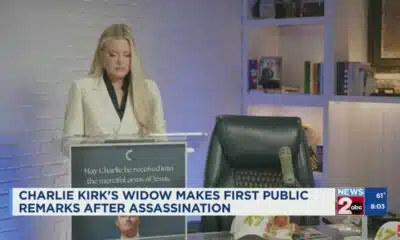News from the South - Oklahoma News Feed
TIMELINE: Storms likely amid alert day in Oklahoma (June 3, 2025)
SUMMARY: Oklahoma faces a Level 2 risk for scattered severe storms today, with a tornado index of 2 indicating possible rotating segments or supercells. Hail up to ping pong ball size and damaging winds of 60-70 mph, with potential gusts near 80 mph, are expected. The greatest threat is flooding due to multiple waves of showers and thunderstorms: the first between 1 and 3 p.m., followed by rain during the evening commute. Storms will move south and east of I-44 by 10 p.m. A flood watch is in effect through Wednesday morning. Another severe weather risk arrives Thursday night into Friday morning.
KOCO 5 Meteorologist Jonathan Conder says be ready for storms and severe weather today.
Subscribe to KOCO on YouTube now for more: http://bit.ly/1lGfjIl
Get more Oklahoma City news: http://www.koco.com
Like us: http://facebook.com/koco5
Follow us: http://twitter.com/koconews
Instagram: https://www.instagram.com/koco5news/
News from the South - Oklahoma News Feed
Attorney General alleges AI used in Swadley's BBQ case
SUMMARY: Attorney General Drummond alleges that Swadley’s BBQ owner Brent Wadley and his defense team used artificial intelligence (AI) in legal filings, leading to errors and falsehoods as their trial approaches in November. The defense denies using AI, attributing mistakes to human error amid tight deadlines. The case involves allegations that Swadley’s overbilled the state by nearly $5 million in a state parks contract, leading to indictments in 2022. The defense seeks to remove the Attorney General, claiming his remarks compromised their fair trial rights. Experts warn AI use by attorneys may be unethical or illegal, with potential punishments pending.
Attorney General alleges AI used in Swadley’s BBQ case
Stay informed about Oklahoma news and weather! Follow KFOR News 4 on our website and social channels.
https://kfor.com/
https://www.youtube.com/c/kfor4news
https://www.facebook.com/kfor4
https://twitter.com/kfor
https://www.instagram.com/kfortv4/
News from the South - Oklahoma News Feed
Judge Attempts to Quash Press Investigation With Gag Order
On August 29, Oklahoma County Special Judge Michelle “Shel” Harrington heard arguments on an Adult Protective Services motion to restrict all visitation for Estelle Simonton, 91. Simonton was moved from her Del City home to Wolfe Living Center at Summit Ridge in Harrah in 2024, after being put under an APS guardianship order.
Harrington did not restrict all visitation, but she came close. Then she added a couple of stunners: ordering her son, Matthew Simonton, not to discuss his mother’s case with his mother and barring her from talking to reporters.
On August 4, Matthew Simonton went to visit his mother. Nursing home staff attempted to deny access; after a tense confrontation, the Oklahoma County Sheriff’s Office was called.
Deputies deferred to statutory proof that a visit was legal; over strenuous objections from nursing home staff, a visit was permitted and a subsequent incident report confirmed that the nursing home did not have the necessary court order to deny visitation.
Though aged, Estelle Simonton was found to be lucid and expressed a fervent desire to be with her son.
“The judge had already ruled that I could see my mother,” Matthew Simonton said. “They were defying what the judge had already ordered.”
Participate in Decisions that Affect Them
In 2015, Rep. Richard Morrissette, D-Oklahoma City, requested guidance from then-Attorney General Scott Pruitt on when and how visitation to a vulnerable adult under a guardianship order can be restricted.
Pruitt’s lengthy opinion first articulated the guiding principle of Title 30, Oklahoma’s laws on guardians and wards.
The clear intent of the law, the opinion said, was to encourage the self-reliance and independence of wards as much as possible; to the maximum extent of their ability, wards should be enabled to participate in all decisions that affect them.
Restriction of visitation to adults under guardianship orders was detailed in Title 43a, Oklahoma’s mental health laws, the opinion said.
Wards should be permitted the ability to associate with whomever they wish, the opinion said; but if a judge does restrict access, the order must specify the persons who are to be restricted.
A Restraining Order is Hereby Entered
In the August 29 hearing, Harrington ruled against the APS request to restrict all access to Estelle Simonton; Matthew Simonton was permitted to visit his mother.
But the judge issued several other rulings.
Special judges in Oklahoma are not elected; district court judges appoint them, and their duties and powers are significantly limited.
Judge Harrington’s LinkedIn page identifies her not as a judge, but as an attorney whose practice is entirely restricted to family law; she is a “divorce lawyer who doesn’t like divorce,” and who values “dating smarter” and “keeping marriage strong.”
In addition to denying APS’s motion, Harrington issued three orders: Matthew Simonton cannot discuss his mother’s case with his mother; he cannot bring anyone other than his domestic partner and her child to visit Estelle Simonton; and access to Estelle Simonton is denied to any member of the media.
“A restraining order is hereby entered preventing Mrs. Simonton from being interviewed by press without further order of this court,” the ruling reads.
Predatory Guardianship
Rick Black, founder of the Center for Estate Administration Reform, which has investigated 5,000 suspect adult guardianships since 2013, said the story of Estelle Simonton reeked of judicial hubris.
Black said that Oklahoma’s guardianship system appeared to lack best practices designed to avoid abuse and ignored an obligation to seek the least restrictive alternatives to guardianship. A lack of respondent counsel, transparency and third-party oversight, combined with an absence of video recordings at hearings and a requirement to seal files to avoid independent investigation, were significant issues with Oklahoma’s system, Black said.
Nationwide, Black said, there was a growing trend toward using claims of defamation as retaliation against those who expose guardianship wrongdoing. Lawsuits have been used to hobble the production of exposé documentary films being produced by Netflix and A&E.
For Black, Estelle Simonton was a case in point.
“The desire to silence [her son] Matthew and isolate Estelle is consistent with a predatory guardianship,” Black said. “The judge attempting to silence media on Estelle’s situation is also concerning.”
Oklahoma law requires judges to seal guardianship cases, a double-edged sword that is meant to protect patient privacy but also effectively thwarts any third-party investigation or oversight, a problem exacerbated by Harrington’s gag order.
Oklahoma City attorney Andy Lester, who has chaired the Oklahoma Free Speech Committee since it was created in 2022, agreed that Harrington’s ruling looks like an inappropriate encroachment on the First Amendment and the freedom of the press.
“This ruling appears to be an overreaching prior restraint,” Lester said. “It looks like a restriction on Ms. Simonton, but, as worded, it purports to bar all press. That is a step too far.”
The court did not respond to a request for comment by the story’s deadline.
No Oklahomans for Oklahoma City Event
In October, the National Guardianship Association will hold a Guardianship/Conservatorship National Investigator Training Program in Oklahoma City. The three-day event will feature talks on nursing home regulations, the ethics and standards of guardianship, and the role of judges in guardianship cases.
Former NGA president Anthony Palmieri, who will deliver the conference’s opening remarks, noted in a September 6 LinkedIn post that there had been no registrations from Oklahoma for the Oklahoma City event.
Editor’s note: This story was updated to show the judge barred Estelle Simonton from speaking to the press, not Matthew Simonton.
This article first appeared on Oklahoma Watch and is republished here under a Creative Commons Attribution-NoDerivatives 4.0 International License.
The post Judge Attempts to Quash Press Investigation With Gag Order appeared first on oklahomawatch.org
Oklahoma Watch, at oklahomawatch.org, is a nonprofit, nonpartisan news organization that covers public-policy issues facing the state.
Note: The following A.I. based commentary is not part of the original article, reproduced above, but is offered in the hopes that it will promote greater media literacy and critical thinking, by making any potential bias more visible to the reader –Staff Editor.
Political Bias Rating: Center-Left
This article critiques the guardianship and judicial system in Oklahoma, highlighting issues of transparency, individual rights, and potential abuses of power. It emphasizes concerns about government overreach, the silencing of dissent, and the protection of vulnerable individuals, which aligns with a center-left perspective that often advocates for civil liberties, accountability, and social justice reforms. The tone is investigative and critical of institutional authority without veering into partisan rhetoric, maintaining a focus on systemic reform rather than ideological extremes.
News from the South - Oklahoma News Feed
College gameday preps underway in Norman
SUMMARY: College Gameday preparations are in full swing in Norman as the University of Oklahoma hosts Michigan in a highly anticipated top-20 matchup Saturday. The national spotlight returns to Norman for the second consecutive year, with the College Gameday stage being set up on the South Oval. Nearby, The Standard restaurant, co-owned by Cameron Brewer, was selected as the guest chef for the show after submitting a proposal to ESPN over Labor Day weekend. They will serve burgers, catfish po’boys, chicken and waffles, and desserts, starting early Saturday before bringing food to the College Gameday set. Excitement is high as the city gears up for game day.
College gameday preps underway in Norman Stay informed about Oklahoma news and weather! Follow KFOR News 4 on our …
-
News from the South - North Carolina News Feed7 days ago
Reagan era credit pumps billions into North Carolina housing | North Carolina
-
News from the South - Alabama News Feed7 days ago
Amid opposition to Blount County medical waste facility, a mysterious Facebook page weighs in
-
News from the South - South Carolina News Feed7 days ago
South Carolina’s Tess Ferm Wins Miss America’s Teen 2026
-
News from the South - Kentucky News Feed7 days ago
3 states push to put the Ten Commandments back in school – banking on new guidance at the Supreme Court
-
Local News7 days ago
Duke University pilot project examining pros and cons of using artificial intelligence in college
-
News from the South - West Virginia News Feed6 days ago
Protesters in D.C. flood the streets demanding an end to Trump’s military deployment
-
News from the South - Missouri News Feed5 days ago
1587 Prime gives first look at food, cocktail menu ahead of grand opening in KC
-
News from the South - Virginia News Feed6 days ago
On the record: Winsome Earle-Sears












































